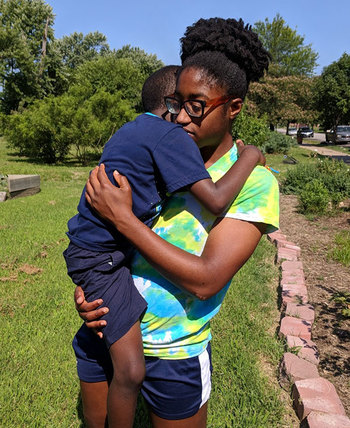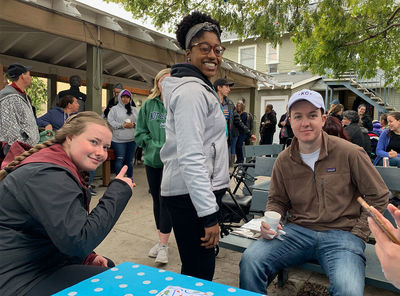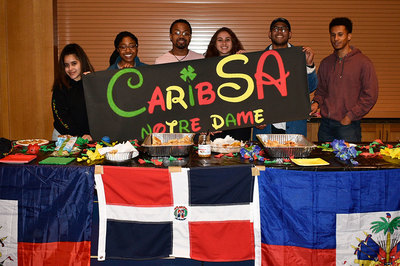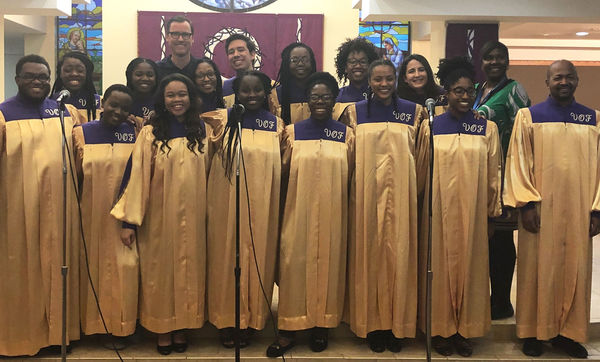Shelene Baiyee’s time at Notre Dame has been characterized by connection – whether it’s with faculty, other students, or seemingly unrelated subject matters.
The rising senior Africana studies and biology major may be busy with clubs, service, research, and more, but never loses sight of what drives her forward — the connection between it all.
“When you have a liberal arts education, it forces you to interact with other fields outside of your necessary major, and it opens your eyes to other points of view,” she said.
 Baiyee carrying the youngest participant at the holding the youngest participant of the Claver House Summer Camp in St. Louis, where she was helping as part of the Center for Social Concerns’ Summer Service Leadership Program.
Baiyee carrying the youngest participant at the holding the youngest participant of the Claver House Summer Camp in St. Louis, where she was helping as part of the Center for Social Concerns’ Summer Service Leadership Program.
Growing up in Indianapolis, science was the way in which Baiyee explored and understood the world. Baiyee is still fascinated by scientific knowledge, but she has also learned that science cannot serve as her only form of understanding.
“I knew that I could not just do STEM, because STEM alone doesn’t explain anything beyond biological processes, how organisms interact together,” she said.
Africana studies provided Baiyee with that other form of understanding.
“It’s really important, especially as a black female in America, to understand the history of race in America, and to acknowledge a lot of history that has been left out of history books,” she said. “Having two extremely different majors allows you to see the interconnectedness of certain topics and life in general, because what you can understand through science can be aided by history.”
Building connections
Baiyee found a home in Africana studies in part through the Building Bridges Mentoring Program, which pairs students from underrepresented populations with faculty members in order to help them thrive academically.
Her mentor — Maria McKenna, senior associate director of the education, schooling, and society minor and an Africana studies faculty member — has been a source of support, guidance, and wisdom.
 Baiyee and two other McNeil Fellows during a spring break immersion trip in California.
Baiyee and two other McNeil Fellows during a spring break immersion trip in California.
“We all can share and learn from one another, and that is something that I learned through Building Bridges,” Baiyee said. “Sometimes it can be intimidating going to talk to a professor, but professors are just as open to learning from you as you always are from them.”
She has also worked as a research assistant for Kraig Beyerlein, an associate professor of sociology, on progressive religious involvement in the 2017 Women’s March Chicago. Baiyee helped obtain data for Beyerlein’s study by conducting phone interviews and sending surveys to participants.
“I’m really interested in understanding how religion plays a role in what people advocate for and what people don’t advocate for,” she said.
That interest also made her a perfect fit for the McNeill Leadership Fellows Program. Founded in the spirit of Rev. Don McNeill, C.S.C., the first director of the Center for Social Concerns, all fellows participate in service, learn about how to be an advocate for change, and engage with the community.
“The point is to not get overwhelmed by all the problems that you see in the world, because no one can solve all the problems. No one person can solve one big problem in the world,” Baiyee said. “But it’s that you have the tools as an individual to understand what you’re passionate about and to use that as a propelling force to start to figure out where change can occur.”
Sparking connections
 Baiyee with previous board members of the Caribbean Student Association.
Baiyee with previous board members of the Caribbean Student Association.
Many of Baiyee’s other extracurriculars embody this mission of service and community formation. She tutors underserved students at the Robinson Community Learning Center and volunteers at the Catholic Worker House in South Bend. She is also involved in cultural organizations that foster community on campus, including the African Student Association, the Caribbean Student Association (of which she is the president), and the Voices of Faith gospel choir.
Last summer, Baiyee participated in the Summer Service Learning Program through the Center for Social Concerns, working as a camp counselor in St. Louis — an experience that drew on her experience in both of her majors.
Working with disadvantaged children, she saw systemic problems with poverty and race, as well as a general aversion to science, which they saw as something completely unrelatable to their lives.
 Baiyee with the Voices of Faith gospel choir.
Baiyee with the Voices of Faith gospel choir.
She and the other counselors created inexpensive and easy experiments that the children could perform at home with the resources available to them, attempting to erase the stigma around STEM fields in impoverished neighborhoods.
Heading into her senior year, Baiyee is contemplating whether to attend medical school, pursue a master’s degree in global health, or apply for a Fulbright grant to teach English in a foreign country.
No matter what path she chooses, her time in Arts and Letters has prepared her to see, make, and develop new connections.
“A liberal arts education,” she said, “is the foundation for developing competent and caring individuals for the world.”
“A liberal arts education is the foundation for developing competent and caring individuals for the world.”
Originally published by at al.nd.edu on June 06, 2019.
